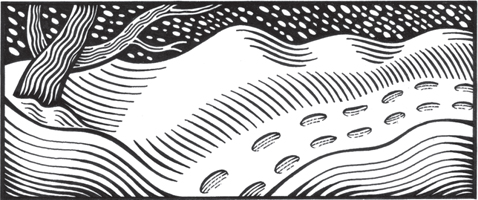

Thoreau observed repeatedly that silence usually taught him more than the company of others.
Just as there are several solitudes, so there are several silences.
One always walks in silence. Once you have left streets, populated roads, public spaces (all that speed, jostling and clamour, the clatter of thousands of footsteps, the white noise of shouts and murmurs, snatches of words, the rumble and whir of engines), silence is retrieved, initially as a transparency. All is calm, expectant and at rest. You are out of the world’s chatter, its corridor echoes, its muttering. Walking: it hits you at first like an immense breathing in the ears. You feel the silence as if it were a great fresh wind blowing away clouds.
There’s the silence of woodland. Clumps and groves of trees form shifting, uncertain walls around us. We walk along existing paths, narrow winding strips of beaten earth. We quickly lose our sense of direction. That silence is tremulous, uneasy.
Then there’s the silence of tough summer afternoon walks across the flank of a mountain, stony paths, exposed to an uncompromising sun. Blinding, mineral, shattering silence. You hear nothing but the quiet crunch of stones underfoot. An implacable, definitive silence, like a transparent death. Sky of a perfectly detached blue. You advance with eyes down, reassuring yourself sometimes with a silent mumbling. Cloudless sky, limestone slabs filled with presence: silence nothing can sidestep. Silence fulfilled, vibrant immobility, tensed like a bow.
There’s the silence of early morning. For long routes in autumn you have to start very early. Outside everything is violet, the dim light slanting through red and gold leaves. It is an expectant silence. You walk softly among huge dark trees, still swathed in traces of blue night. You are almost afraid of awakening. Everything whispering quietly.
There’s the silence of walks through the snow, muffled footsteps under a white sky. All around you nothing moves. Things and even time itself are iced up, frozen solid in silent immobility. Everything is stopped, unified, thickly padded. A watching silence, white, fluffy, suspended as if in parentheses.
Lastly, there’s the unique silence of night. If, owing to nightfall, when the lodging is still too far, you have chosen to sleep under the stars, taken trouble to find a good place, warmed yourself and eaten, you fall asleep quickly and easily. But then there always comes that moment of awakening, after several hours of slumber, still in the fastness of the night. The eyes open abruptly as if seized by the depth of the silence. Any shifting to ease your limbs, the rustle of your sleeping bag, assume enormous proportions. So what is it that woke you? The very sound of silence?
In a chapter entitled ‘A Night Among the Pines’, Stevenson mentions this sudden-awakening phenomenon, placing it around two in the morning and seeing it as affecting, at the same moment, all living beings asleep outside. He views it as a minor cosmic mystery: could it be a tremor of the earth running through our bodies? A moment of acceleration in the night? An invisible dew originating in the stars? At any rate it is a startling moment, in which the silence can be heard physically as music, or rather it is the moment when, lifting your head, you hear quite distinctly the music of the spheres.
What is called ‘silence’ in walking is, in the first place, the abolishment of chatter, of that permanent noise that blanks and fogs everything, invading the vast prairies of our consciousness like couch-grass. Chatter deafens: it turns everything into nonsense, intoxicates you, makes you lose your head. It is always there on all sides, overflowing, running everywhere, in all directions.
But above all, silence is the dissipation of our language. Everything, in this world of work, leisure, activity, reproduction and consumption of things, everything has its function, its place, its utility, and a specific word that corresponds to it. Likewise our grammar reproduces our sequencings of action, our laborious grasp of things, our fuss and bustle. Always doing, producing, forever busying ourselves. Our language is tailored to the conventions of fabricated things, predictable gestures, normalized behaviours, received attitudes. Artifices adapted to one another: language is caught in the everyday construction of the world, participates in it, belongs to the same order of things as pictures and numbers and lists – order, injunction, synthesis, decision, report, code. Language is an instruction slip, a price list. In the silence of a walk, when you end up losing the use of words because by then you are doing nothing but walk (and here one should beware of those expedition guides who recode, detail, inform, punctuate the walk with names and explanations – the relief, the types of rock, the slopes, the names of plants and their virtues – to give the impression that everything visible has a name, that there is a grammar for everything that can be felt), in that silence you hear better, because you are finally hearing what has no vocation to be retranslated, recoded, reformatted.
‘Before speaking, a man should see.’
The only words remaining to the walker are barely mutterings, words he catches himself saying (‘Come on, come on, come on’, ‘That’s it, ‘Oh, all right’, ‘There it is, there it is’), words hung like garlands on the fleeting seconds, commonplace, words not to say anything but to punctuate the silence with a supplementary vibration, just to hear his own echo.